人教版(2019)必修一Unit 3 Sports and fitness Discovering Useful Structures & Listening and Talking课件(共34张PP
文档属性
| 名称 | 人教版(2019)必修一Unit 3 Sports and fitness Discovering Useful Structures & Listening and Talking课件(共34张PP |  | |
| 格式 | pptx | ||
| 文件大小 | 2.1MB | ||
| 资源类型 | 教案 | ||
| 版本资源 | 人教版(2019) | ||
| 科目 | 英语 | ||
| 更新时间 | 2023-11-02 18:13:52 | ||
图片预览

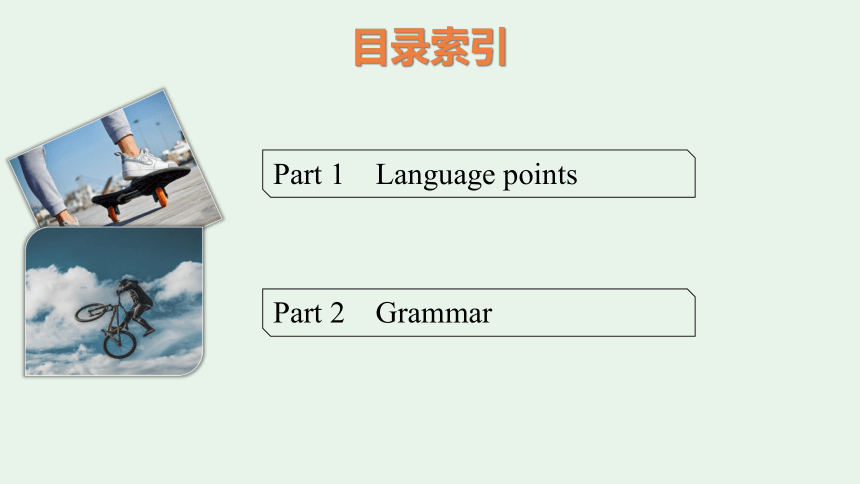
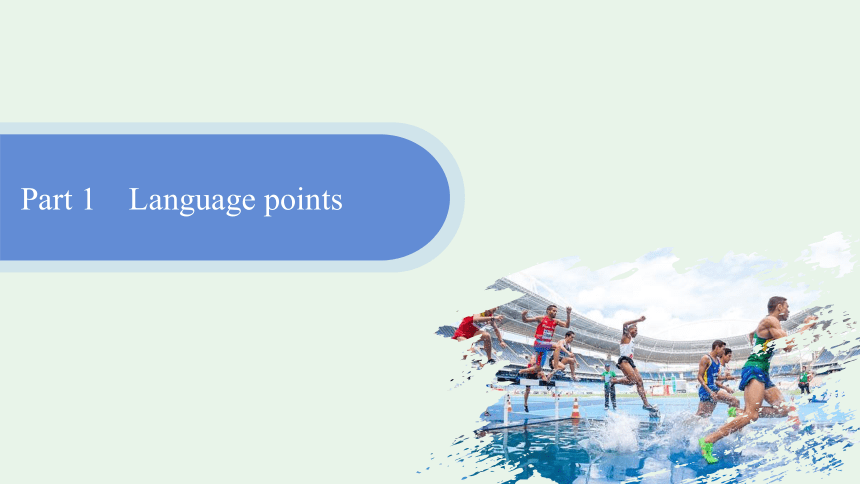
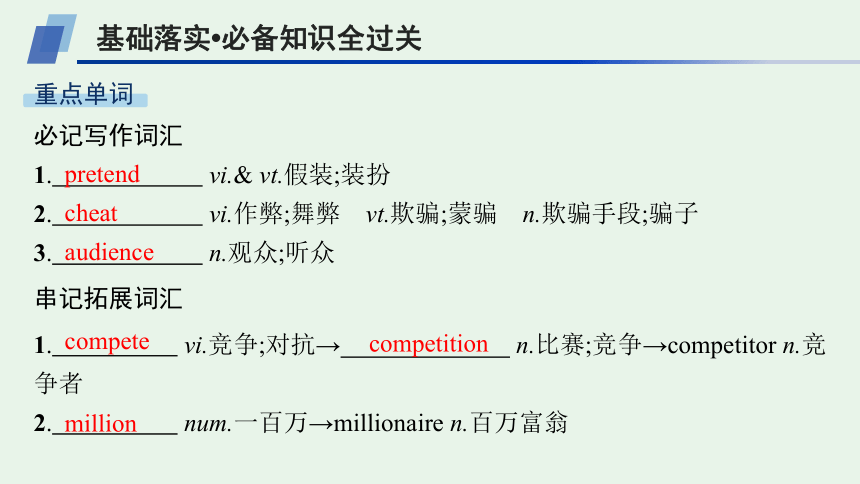
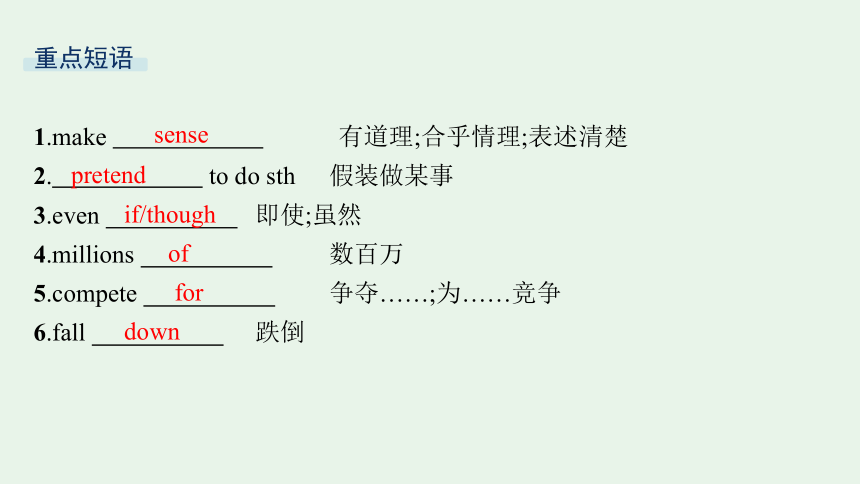
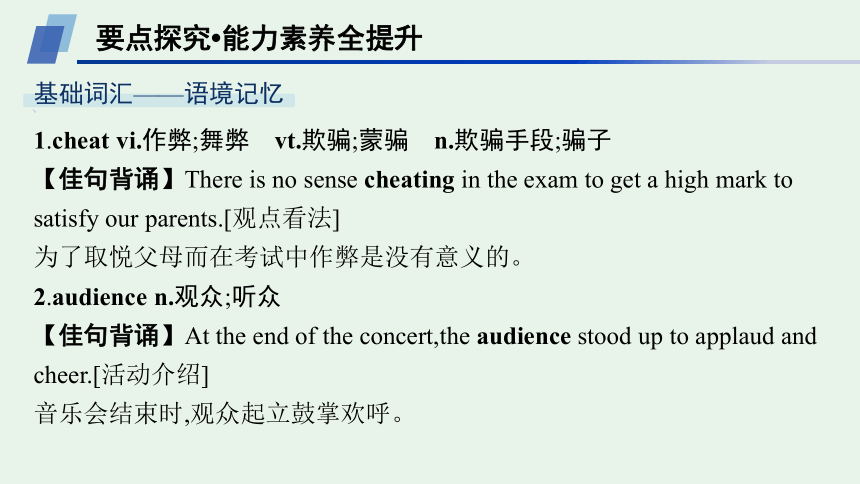
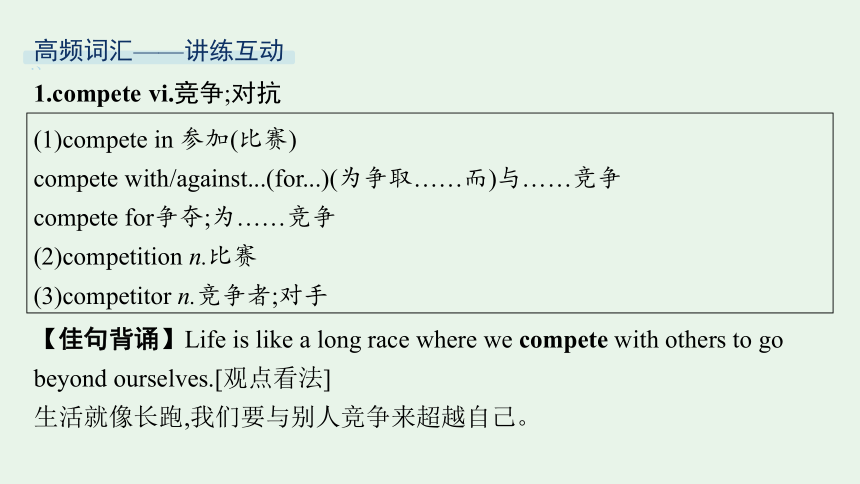
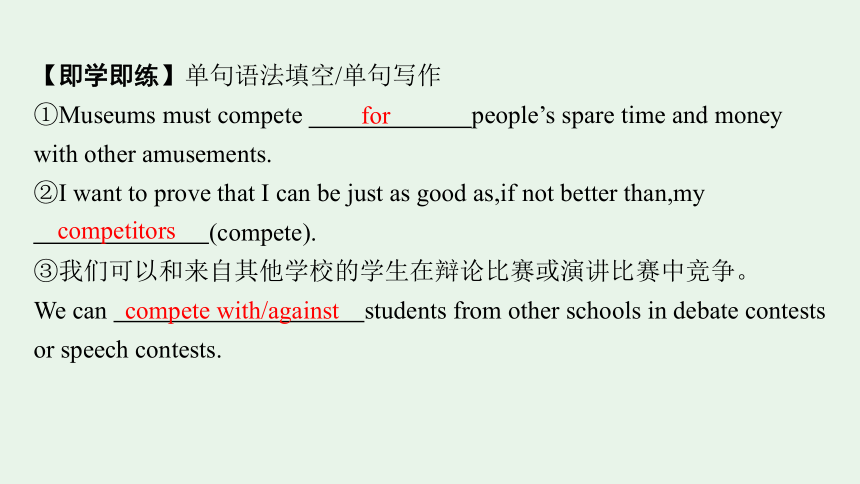
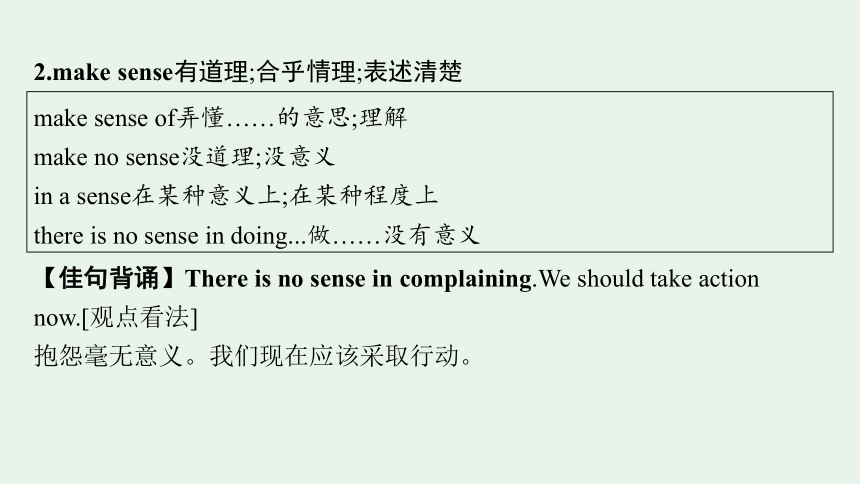
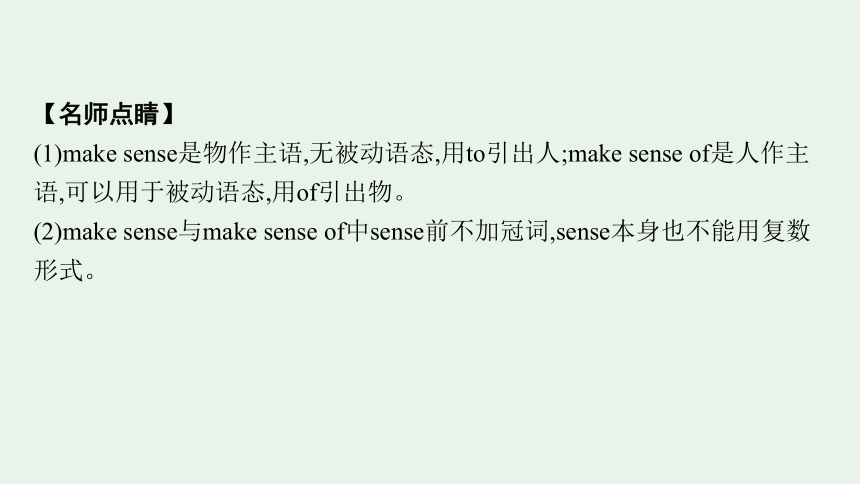
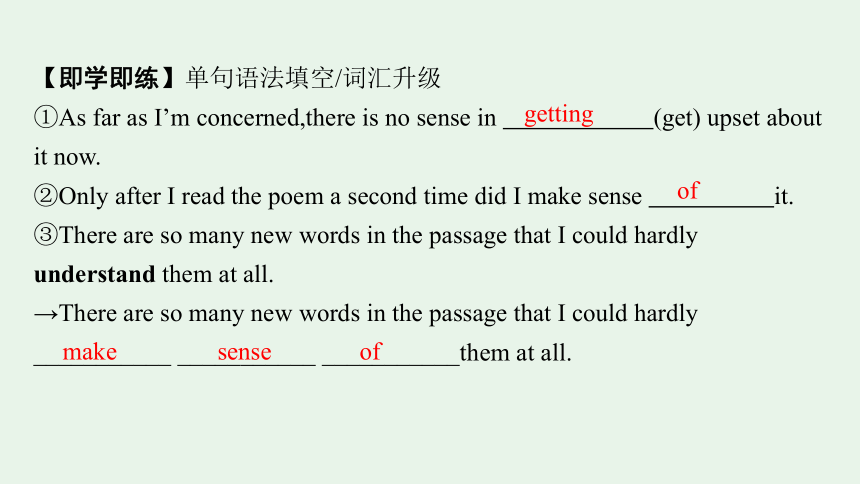
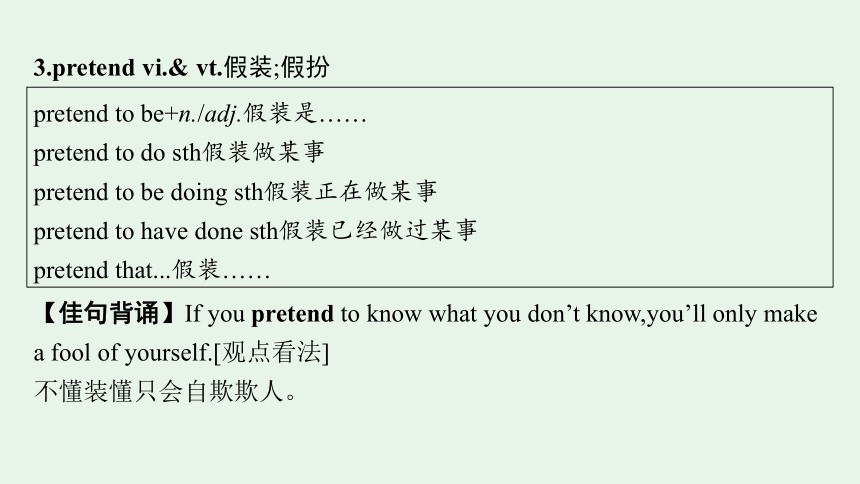
文档简介
(共34张PPT)
UNIT 3 SPORTS AND FITNESS
Section C Discovering Useful Structures & Listening and Talking
Part 1 Language points
Part 2 Grammar
目录索引
Part 1 Language points
基础落实 必备知识全过关
重点单词
必记写作词汇
1. vi.& vt.假装;装扮
2. vi.作弊;舞弊 vt.欺骗;蒙骗 n.欺骗手段;骗子
3. n.观众;听众
串记拓展词汇
1. vi.竞争;对抗→ n.比赛;竞争→competitor n.竞争者
2. num.一百万→millionaire n.百万富翁
pretend
cheat
audience
compete
competition
million
重点短语
1.make 有道理;合乎情理;表述清楚
2. to do sth 假装做某事
3.even 即使;虽然
4.millions 数百万
5.compete 争夺……;为……竞争
6.fall 跌倒
if/though
of
for
down
sense
pretend
要点探究 能力素养全提升
、
基础词汇——语境记忆
1.cheat vi.作弊;舞弊 vt.欺骗;蒙骗 n.欺骗手段;骗子
【佳句背诵】There is no sense cheating in the exam to get a high mark to satisfy our parents.[观点看法]
为了取悦父母而在考试中作弊是没有意义的。
2.audience n.观众;听众
【佳句背诵】At the end of the concert,the audience stood up to applaud and cheer.[活动介绍]
音乐会结束时,观众起立鼓掌欢呼。
.、
高频词汇——讲练互动
1.compete vi.竞争;对抗
(1)compete in 参加(比赛)
compete with/against...(for...)(为争取……而)与……竞争
compete for争夺;为……竞争
(2)competition n.比赛
(3)competitor n.竞争者;对手
【佳句背诵】Life is like a long race where we compete with others to go beyond ourselves.[观点看法]
生活就像长跑,我们要与别人竞争来超越自己。
【即学即练】单句语法填空/单句写作
①Museums must compete people’s spare time and money with other amusements.
②I want to prove that I can be just as good as,if not better than,my
(compete).
③我们可以和来自其他学校的学生在辩论比赛或演讲比赛中竞争。
We can students from other schools in debate contests or speech contests.
for
competitors
compete with/against
2.make sense有道理;合乎情理;表述清楚
make sense of弄懂……的意思;理解
make no sense没道理;没意义
in a sense在某种意义上;在某种程度上
there is no sense in doing...做……没有意义
【佳句背诵】There is no sense in complaining.We should take action now.[观点看法]
抱怨毫无意义。我们现在应该采取行动。
【名师点睛】
(1)make sense是物作主语,无被动语态,用to引出人;make sense of是人作主语,可以用于被动语态,用of引出物。
(2)make sense与make sense of中sense前不加冠词,sense本身也不能用复数形式。
【即学即练】单句语法填空/词汇升级
①As far as I’m concerned,there is no sense in (get) upset about it now.
②Only after I read the poem a second time did I make sense it.
③There are so many new words in the passage that I could hardly understand them at all.
→There are so many new words in the passage that I could hardly ___________ ___________ ___________them at all.
getting
of
make sense of
3.pretend vi.& vt.假装;假扮
pretend to be+n./adj.假装是……
pretend to do sth假装做某事
pretend to be doing sth假装正在做某事
pretend to have done sth假装已经做过某事
pretend that...假装……
【佳句背诵】If you pretend to know what you don’t know,you’ll only make a fool of yourself.[观点看法]
不懂装懂只会自欺欺人。
【即学即练】单句语法填空/句型转换
①She pretended (do) her homework when her mother came in.
②When my mother came back,I pretended (fall) asleep.
③She opened a book, (pretend) to read,with tears dropping on the page.
④She pretended that she didn’t know me when we met in the street.
→She pretended ___________ ___________ ___________ _________when we met in the street.
to be doing
to have fallen
pretending
not to know me
、
重点句式——多维剖析
even if引导的让步状语从句
【教材原句】I agree with the idea that a soccer player should never pretend to fall down even if it helps his or her team.
我同意这个看法,足球运动员不应该假装摔倒,即使这对他或她的球队有帮助。
(1)even if=even though意为“即使;虽然”,是连词词组,用来引导让步状语从句。
(2)在even if/though引导的让步状语从句中,如主句从句都表示将来的动作,从句中要用一般现在时来表示将来时。
(3)在even if/ though引导的让步状语从句中,如果主句的主语和从句的主语一致,且从句中有be动词时,可以把从句的主语和be动词省略。
【佳句背诵】Even though the problem was difficult to solve,I didn’t give up.Because I firmly believed that “Where there is a will,there is a way.” [人物介绍]
尽管这个问题很难解决,但我没有放弃。因为我坚信“有志者事竟成”。
【即学即练】单句写作/句式升级
①即使明天下雨,我也要去海边。
I will go to the beach tomorrow.
②尽管我们在性格上不同,但我们仍然是好朋友。
different from each other in character,we are still good friends.
③The man is so strange that he never speaks,even if he is asked to.
→The man is so strange that he never speaks,even if .(升级为省略句)
even if/though it rains
Even if/though we are
asked to
Part 2 Grammar
语法冲关 语言规则全理清
情景导入
附加疑问句
观察下列短文,注意黑体部分所用的形式。
①He comes here often,doesn’t he
②You’ve lost some weight,haven’t you
③It won’t make me too tired,will it
④This isn’t your first time to the museum,is it
⑤I don’t have to come here every day,do I
⑥Tom was not late for class,was he
【语法感悟】
1.第①②句中前半部分是 句,附加疑问句用 形式。
2.第③④⑤⑥句中前半部分是 句,附加疑问句用 形式。
3.第⑥句中的主语Tom是 ,附加疑问句的主语he是 。
肯定
否定
否定
肯定
名词
代词
语法精讲
附加疑问句,又叫反意疑问句,其作用是说话人向对方验证自己的陈述或者判断,也可以用于祈使句表示请求或建议。
一、附加疑问句的组成
1.肯定式陈述部分 + 否定附加疑问部分
The sports meeting is to take place tomorrow,isn’t it
运动会明天举行,对吗
Tom failed to pass the English exam last week,didn’t he
汤姆上周英语考试不及格,不是吗
2.否定式陈述部分 + 肯定附加疑问部分
Your brother isn’t doing his homework,is he
你弟弟没在做作业,对吗
Mary doesn’t go to school by bus,does she
玛丽不乘公共汽车去上学,是吗
3.含有否定词的陈述部分 + 肯定附加疑问部分
There is nobody in the room,is there
房间里没有人,是吗
They have never learned English,have they
他们从没学过英语,是吗
二、附加疑问句的回答
回答附加疑问句和回答一般疑问句一样,肯定回答用“Yes,+肯定结构”;否定回答用“No,+否定结构”,这与汉语习惯有所不同。
—He’s a doctor,isn’t he
——他是医生,对吧
—Yes,he is./No,he isn’t.
——对,他是医生。/不,他不是医生。
—He isn’t a doctor,is he
——他不是医生,对吧
—Yes,he is./No,he isn’t.
——不,他是医生。/对,他不是医生。
三、附加疑问部分的读法
陈述部分一般用降调,而附加疑问部分既可以用降调也可用升调,但含义有所不同。通常情况下,用升调多表示疑问或请求;用降调时,多表示求证或希望对方同意。
Tom has won the first prize in the ↘competition,↗hasn’t he (表示疑问)
Tom has won the first prize in the ↘competition,↘hasn’t he (表示求证)
You’re from ↘Canada,↘aren’t you (心里觉得对方就是加拿大人)
You’re from ↘Canada,↗aren’t you (不知道对方是不是加拿大人)
四、附加疑问句需要注意的几个问题
1.如果陈述部分中的主语是不定式短语、动词-ing短语、从句、everything、something或nothing时,附加疑问部分通常要用it作主语。
Something is wrong with the machine,isn’t it
这台机器出毛病了,是吗
What he said just now is reasonable,isn’t it
他刚才说的话合情合理,对吗
【即学即练】完成下面附加疑问句
①Learning English well is not easy,
②What he told me is true,
③Nothing is difficult in the world if you put your heart into it,
is it
isn’t it
is it
2.陈述部分中的主语是不定代词everybody、everyone、somebody、someone、nobody、no one、each等时,附加疑问部分通常要用they或he作主语。
Somebody borrowed my bike,didn’t they/ he
有人把我的自行车借走了,对不对
【即学即练】完成下面附加疑问句
①Nobody can predict the exact outcome,
②Everyone in this group is important,
③Nobody failed in the exam this time,
can’t they/he
isn’t they/he
didn’t they/he
3.陈述部分带有little、few、never、hardly、seldom等否定意义的词时,附加疑问部分用肯定式。如:
She never tells a lie,does she
她从不说谎,对吗
He was seldom late,was he
他很少迟到,是不是
【即学即练】完成下面附加疑问句
①Your sister seldom takes a bus to school,
②There are few new words in this lesson,
does she
are there
4.附加疑问句的陈述部分含带有un-、im-、in-、dis- 等否定前缀的词时,陈述部分要视为肯定含义,附加疑问部分用否定式。
It is impossible to learn English without remembering more words,isn’t it
不多记单词学英语是不可能的,对吧
【即学即练】完成下面附加疑问句
①That man has an unhealthy diet,
②These roads are unsuitable for use by heavy vehicles,
③It is unhealthy to eat so much junk food every day,
hasn’t he
aren’t they
isn’t it
5.如果陈述部分是含有宾语从句的复合句式,附加疑问部分的主语以及谓语动词的人称、数、时态通常要与陈述部分的主句保持一致。
I told you to be careful with the work,didn’t I
我告诉过你工作要小心,对不对
注意:
附加疑问句的陈述部分为“I/We think(或believe,suppose,consider) + that从句”时,附加疑问部分的主语要与that从句的主语保持一致。
I think that he has done his best,hasn’t he
我认为他尽了最大的努力,对吗
We don’t think that English is very hard,is it
我们认为英语不太难,对不对
【即学即练】完成下面附加疑问句
①You said you would buy him a gift on his birthday,
②I don’t think she will go to the concert with us,
③He hoped she could continue the family tradition,
didn’t you
will she
didn’t he
6.陈述部分为肯定式祈使句时,附加疑问部分用won’t you或will you;陈述部分为否定式祈使句时,附加疑问部分要用will you。
Come in and have a cup of coffee,won’t you/will you
进来喝杯咖啡好吗
Don’t get close to the river bank,will you
不要靠近河岸,好吗
【即学即练】完成下面附加疑问句
①Don’t go near the bank of the river because it is dangerous,
②Lend her your dictionary,
will you
will you/won’t you
7.陈述部分为Let us...时,附加疑问部分习惯上用will you;陈述部分为Let’s...时,附加疑问部分习惯上用shall we。
Let us do the work all by ourselves,will you
让我们自己做这项工作,好吗
Let’s go out for a walk,shall we
我们出去散步吧,行吗
【即学即练】完成下面附加疑问句
①Let’s have a picnic in the park next Sunday,
②Let us help them get those boxes down,
③Let’s go fishing this weekend,
shall we
will you
shall we
8.动词have表示“有”时,可以有两种附加疑问句形式;have表示其他含义(如:经历、遭受、得到、吃……)时,附加疑问部分则要借助助动词。
He has an English dictionary,hasn’t he/doesn’t he
他有本英语字典,不是吗
They had milk and bread for breakfast,didn’t they
他们早饭吃的牛奶和面包,对吗
【即学即练】完成下面附加疑问句
①Mr Brown has a house with a beautiful garden,
②The boy has to stay at home to look after his little sister,
③You had bread and egg for breakfast this morning,
hasn’t/doesn’t he
doesn’t he
didn’t you
本 课 结 束
UNIT 3 SPORTS AND FITNESS
Section C Discovering Useful Structures & Listening and Talking
Part 1 Language points
Part 2 Grammar
目录索引
Part 1 Language points
基础落实 必备知识全过关
重点单词
必记写作词汇
1. vi.& vt.假装;装扮
2. vi.作弊;舞弊 vt.欺骗;蒙骗 n.欺骗手段;骗子
3. n.观众;听众
串记拓展词汇
1. vi.竞争;对抗→ n.比赛;竞争→competitor n.竞争者
2. num.一百万→millionaire n.百万富翁
pretend
cheat
audience
compete
competition
million
重点短语
1.make 有道理;合乎情理;表述清楚
2. to do sth 假装做某事
3.even 即使;虽然
4.millions 数百万
5.compete 争夺……;为……竞争
6.fall 跌倒
if/though
of
for
down
sense
pretend
要点探究 能力素养全提升
、
基础词汇——语境记忆
1.cheat vi.作弊;舞弊 vt.欺骗;蒙骗 n.欺骗手段;骗子
【佳句背诵】There is no sense cheating in the exam to get a high mark to satisfy our parents.[观点看法]
为了取悦父母而在考试中作弊是没有意义的。
2.audience n.观众;听众
【佳句背诵】At the end of the concert,the audience stood up to applaud and cheer.[活动介绍]
音乐会结束时,观众起立鼓掌欢呼。
.、
高频词汇——讲练互动
1.compete vi.竞争;对抗
(1)compete in 参加(比赛)
compete with/against...(for...)(为争取……而)与……竞争
compete for争夺;为……竞争
(2)competition n.比赛
(3)competitor n.竞争者;对手
【佳句背诵】Life is like a long race where we compete with others to go beyond ourselves.[观点看法]
生活就像长跑,我们要与别人竞争来超越自己。
【即学即练】单句语法填空/单句写作
①Museums must compete people’s spare time and money with other amusements.
②I want to prove that I can be just as good as,if not better than,my
(compete).
③我们可以和来自其他学校的学生在辩论比赛或演讲比赛中竞争。
We can students from other schools in debate contests or speech contests.
for
competitors
compete with/against
2.make sense有道理;合乎情理;表述清楚
make sense of弄懂……的意思;理解
make no sense没道理;没意义
in a sense在某种意义上;在某种程度上
there is no sense in doing...做……没有意义
【佳句背诵】There is no sense in complaining.We should take action now.[观点看法]
抱怨毫无意义。我们现在应该采取行动。
【名师点睛】
(1)make sense是物作主语,无被动语态,用to引出人;make sense of是人作主语,可以用于被动语态,用of引出物。
(2)make sense与make sense of中sense前不加冠词,sense本身也不能用复数形式。
【即学即练】单句语法填空/词汇升级
①As far as I’m concerned,there is no sense in (get) upset about it now.
②Only after I read the poem a second time did I make sense it.
③There are so many new words in the passage that I could hardly understand them at all.
→There are so many new words in the passage that I could hardly ___________ ___________ ___________them at all.
getting
of
make sense of
3.pretend vi.& vt.假装;假扮
pretend to be+n./adj.假装是……
pretend to do sth假装做某事
pretend to be doing sth假装正在做某事
pretend to have done sth假装已经做过某事
pretend that...假装……
【佳句背诵】If you pretend to know what you don’t know,you’ll only make a fool of yourself.[观点看法]
不懂装懂只会自欺欺人。
【即学即练】单句语法填空/句型转换
①She pretended (do) her homework when her mother came in.
②When my mother came back,I pretended (fall) asleep.
③She opened a book, (pretend) to read,with tears dropping on the page.
④She pretended that she didn’t know me when we met in the street.
→She pretended ___________ ___________ ___________ _________when we met in the street.
to be doing
to have fallen
pretending
not to know me
、
重点句式——多维剖析
even if引导的让步状语从句
【教材原句】I agree with the idea that a soccer player should never pretend to fall down even if it helps his or her team.
我同意这个看法,足球运动员不应该假装摔倒,即使这对他或她的球队有帮助。
(1)even if=even though意为“即使;虽然”,是连词词组,用来引导让步状语从句。
(2)在even if/though引导的让步状语从句中,如主句从句都表示将来的动作,从句中要用一般现在时来表示将来时。
(3)在even if/ though引导的让步状语从句中,如果主句的主语和从句的主语一致,且从句中有be动词时,可以把从句的主语和be动词省略。
【佳句背诵】Even though the problem was difficult to solve,I didn’t give up.Because I firmly believed that “Where there is a will,there is a way.” [人物介绍]
尽管这个问题很难解决,但我没有放弃。因为我坚信“有志者事竟成”。
【即学即练】单句写作/句式升级
①即使明天下雨,我也要去海边。
I will go to the beach tomorrow.
②尽管我们在性格上不同,但我们仍然是好朋友。
different from each other in character,we are still good friends.
③The man is so strange that he never speaks,even if he is asked to.
→The man is so strange that he never speaks,even if .(升级为省略句)
even if/though it rains
Even if/though we are
asked to
Part 2 Grammar
语法冲关 语言规则全理清
情景导入
附加疑问句
观察下列短文,注意黑体部分所用的形式。
①He comes here often,doesn’t he
②You’ve lost some weight,haven’t you
③It won’t make me too tired,will it
④This isn’t your first time to the museum,is it
⑤I don’t have to come here every day,do I
⑥Tom was not late for class,was he
【语法感悟】
1.第①②句中前半部分是 句,附加疑问句用 形式。
2.第③④⑤⑥句中前半部分是 句,附加疑问句用 形式。
3.第⑥句中的主语Tom是 ,附加疑问句的主语he是 。
肯定
否定
否定
肯定
名词
代词
语法精讲
附加疑问句,又叫反意疑问句,其作用是说话人向对方验证自己的陈述或者判断,也可以用于祈使句表示请求或建议。
一、附加疑问句的组成
1.肯定式陈述部分 + 否定附加疑问部分
The sports meeting is to take place tomorrow,isn’t it
运动会明天举行,对吗
Tom failed to pass the English exam last week,didn’t he
汤姆上周英语考试不及格,不是吗
2.否定式陈述部分 + 肯定附加疑问部分
Your brother isn’t doing his homework,is he
你弟弟没在做作业,对吗
Mary doesn’t go to school by bus,does she
玛丽不乘公共汽车去上学,是吗
3.含有否定词的陈述部分 + 肯定附加疑问部分
There is nobody in the room,is there
房间里没有人,是吗
They have never learned English,have they
他们从没学过英语,是吗
二、附加疑问句的回答
回答附加疑问句和回答一般疑问句一样,肯定回答用“Yes,+肯定结构”;否定回答用“No,+否定结构”,这与汉语习惯有所不同。
—He’s a doctor,isn’t he
——他是医生,对吧
—Yes,he is./No,he isn’t.
——对,他是医生。/不,他不是医生。
—He isn’t a doctor,is he
——他不是医生,对吧
—Yes,he is./No,he isn’t.
——不,他是医生。/对,他不是医生。
三、附加疑问部分的读法
陈述部分一般用降调,而附加疑问部分既可以用降调也可用升调,但含义有所不同。通常情况下,用升调多表示疑问或请求;用降调时,多表示求证或希望对方同意。
Tom has won the first prize in the ↘competition,↗hasn’t he (表示疑问)
Tom has won the first prize in the ↘competition,↘hasn’t he (表示求证)
You’re from ↘Canada,↘aren’t you (心里觉得对方就是加拿大人)
You’re from ↘Canada,↗aren’t you (不知道对方是不是加拿大人)
四、附加疑问句需要注意的几个问题
1.如果陈述部分中的主语是不定式短语、动词-ing短语、从句、everything、something或nothing时,附加疑问部分通常要用it作主语。
Something is wrong with the machine,isn’t it
这台机器出毛病了,是吗
What he said just now is reasonable,isn’t it
他刚才说的话合情合理,对吗
【即学即练】完成下面附加疑问句
①Learning English well is not easy,
②What he told me is true,
③Nothing is difficult in the world if you put your heart into it,
is it
isn’t it
is it
2.陈述部分中的主语是不定代词everybody、everyone、somebody、someone、nobody、no one、each等时,附加疑问部分通常要用they或he作主语。
Somebody borrowed my bike,didn’t they/ he
有人把我的自行车借走了,对不对
【即学即练】完成下面附加疑问句
①Nobody can predict the exact outcome,
②Everyone in this group is important,
③Nobody failed in the exam this time,
can’t they/he
isn’t they/he
didn’t they/he
3.陈述部分带有little、few、never、hardly、seldom等否定意义的词时,附加疑问部分用肯定式。如:
She never tells a lie,does she
她从不说谎,对吗
He was seldom late,was he
他很少迟到,是不是
【即学即练】完成下面附加疑问句
①Your sister seldom takes a bus to school,
②There are few new words in this lesson,
does she
are there
4.附加疑问句的陈述部分含带有un-、im-、in-、dis- 等否定前缀的词时,陈述部分要视为肯定含义,附加疑问部分用否定式。
It is impossible to learn English without remembering more words,isn’t it
不多记单词学英语是不可能的,对吧
【即学即练】完成下面附加疑问句
①That man has an unhealthy diet,
②These roads are unsuitable for use by heavy vehicles,
③It is unhealthy to eat so much junk food every day,
hasn’t he
aren’t they
isn’t it
5.如果陈述部分是含有宾语从句的复合句式,附加疑问部分的主语以及谓语动词的人称、数、时态通常要与陈述部分的主句保持一致。
I told you to be careful with the work,didn’t I
我告诉过你工作要小心,对不对
注意:
附加疑问句的陈述部分为“I/We think(或believe,suppose,consider) + that从句”时,附加疑问部分的主语要与that从句的主语保持一致。
I think that he has done his best,hasn’t he
我认为他尽了最大的努力,对吗
We don’t think that English is very hard,is it
我们认为英语不太难,对不对
【即学即练】完成下面附加疑问句
①You said you would buy him a gift on his birthday,
②I don’t think she will go to the concert with us,
③He hoped she could continue the family tradition,
didn’t you
will she
didn’t he
6.陈述部分为肯定式祈使句时,附加疑问部分用won’t you或will you;陈述部分为否定式祈使句时,附加疑问部分要用will you。
Come in and have a cup of coffee,won’t you/will you
进来喝杯咖啡好吗
Don’t get close to the river bank,will you
不要靠近河岸,好吗
【即学即练】完成下面附加疑问句
①Don’t go near the bank of the river because it is dangerous,
②Lend her your dictionary,
will you
will you/won’t you
7.陈述部分为Let us...时,附加疑问部分习惯上用will you;陈述部分为Let’s...时,附加疑问部分习惯上用shall we。
Let us do the work all by ourselves,will you
让我们自己做这项工作,好吗
Let’s go out for a walk,shall we
我们出去散步吧,行吗
【即学即练】完成下面附加疑问句
①Let’s have a picnic in the park next Sunday,
②Let us help them get those boxes down,
③Let’s go fishing this weekend,
shall we
will you
shall we
8.动词have表示“有”时,可以有两种附加疑问句形式;have表示其他含义(如:经历、遭受、得到、吃……)时,附加疑问部分则要借助助动词。
He has an English dictionary,hasn’t he/doesn’t he
他有本英语字典,不是吗
They had milk and bread for breakfast,didn’t they
他们早饭吃的牛奶和面包,对吗
【即学即练】完成下面附加疑问句
①Mr Brown has a house with a beautiful garden,
②The boy has to stay at home to look after his little sister,
③You had bread and egg for breakfast this morning,
hasn’t/doesn’t he
doesn’t he
didn’t you
本 课 结 束
